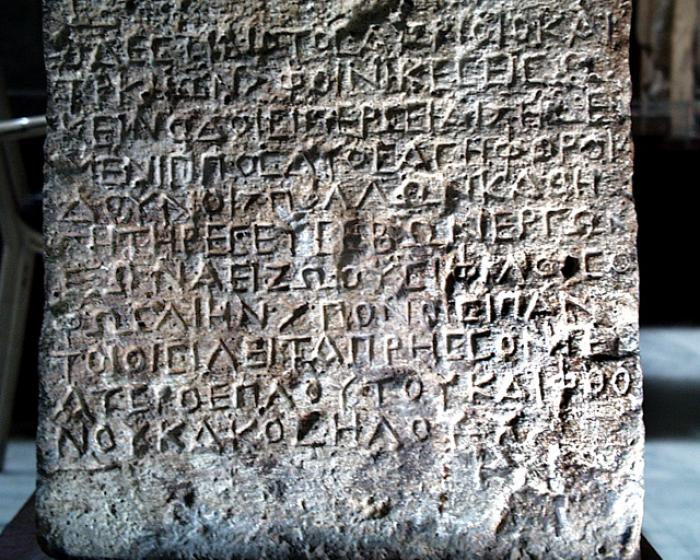NEWS
LaPIs - 19 dicembre 2025
leggiIl paesaggio epigrafico di Gortina
Pisa SNS, 18-19 dicembre 2025
leggiIDEA FINANCIAL SUPPORT FOR EARLY CAREER SCHOLARS
PARTICIPATING IN THE NEXT EPIGRAPHY.INFO EVENT
leggi
RESOCONTI
Bologna EpiDoc Workshop 2019
Bologna, 27-31 maggio 2019
Resoconto di Matteo Rivoli
leggiSAEG 5° Seminario Avanzato di Epigrafia Greca
Torino, 18-20 gennaio 2017
Resoconto di Francesca Giovagnorio
leggiEpiDoc Workshop Bologna 2016
Bologna, 12-14 settembre 2016
Resoconto di Irene Nicolino
leggiRestoring and attributing ancient texts using deep neural networks
Nature, 9.3.2022
We share the announcement of a new publication, titled “Restoring and attributing ancient texts using deep neural networks”, published on the cover of this week's issue of the scientific journal Nature. This work is the result of a collaboration between the Universities of Venice Ca’ Foscari, Oxford and Athens AUEB, and Google’s DeepMind.
The article presents Ithaca, the first deep neural network that can aid historians in not only restoring the missing text of ancient Greek inscriptions, but also identifying their original location, and establishing the date they were written.
Ithaca is designed to assist and expand the historian’s workflow: its architecture focuses on collaboration, decision support, and interpretability. Working alone, Ithaca is able to restore damaged texts with a 62% accuracy, but when evaluated historians use Ithaca, their accuracy on the same task rises to 72%. Ithaca can also determine the original geographical location of inscriptions with 71% accuracy, and can date them to less than 30 years from the date ranges proposed by historians, redating key texts of Classical Athens and contributing to topical debates in Ancient History.
This work shows how models like Ithaca can unlock the cooperative potential between AI and historians, transformationally impacting the way we study and write about one of the most significant periods in human history.
To make the research widely available to researchers, educators, museum staff and others, the authors partnered with Google Cloud and Google Arts & Culture to launch a free interactive version of Ithaca and also open sourced the code.
Links:
Link to published paper (open access): https://www.nature.com/articles/s41586-022-04448-z
Link to Ithaca’s free online interface: https://ithaca.deepmind.com
Link to Nature's announcement video: https://www.youtube.com/watch?v=rq0Ex_qCKeQ
Link to Ca' Foscari's press release (in Italian): https://www.unive.it/pag/14024/?tx_news_pi1%5Bnews%5D=12038&cHash=ee3ef41bb70b14cbda7f8dba3f65f07f
Link to the open source code: https://github.com/deepmind/ithaca
Ithaca's authors: Yannis Assael*, Thea Sommerschield*, Brendan Shillingford, Mahyar Bordbar, John Pavlopoulos, Marita Chatzipanagiotou, Ion Androutsopoulos, Jonathan Prag & Nando de Freitas.
